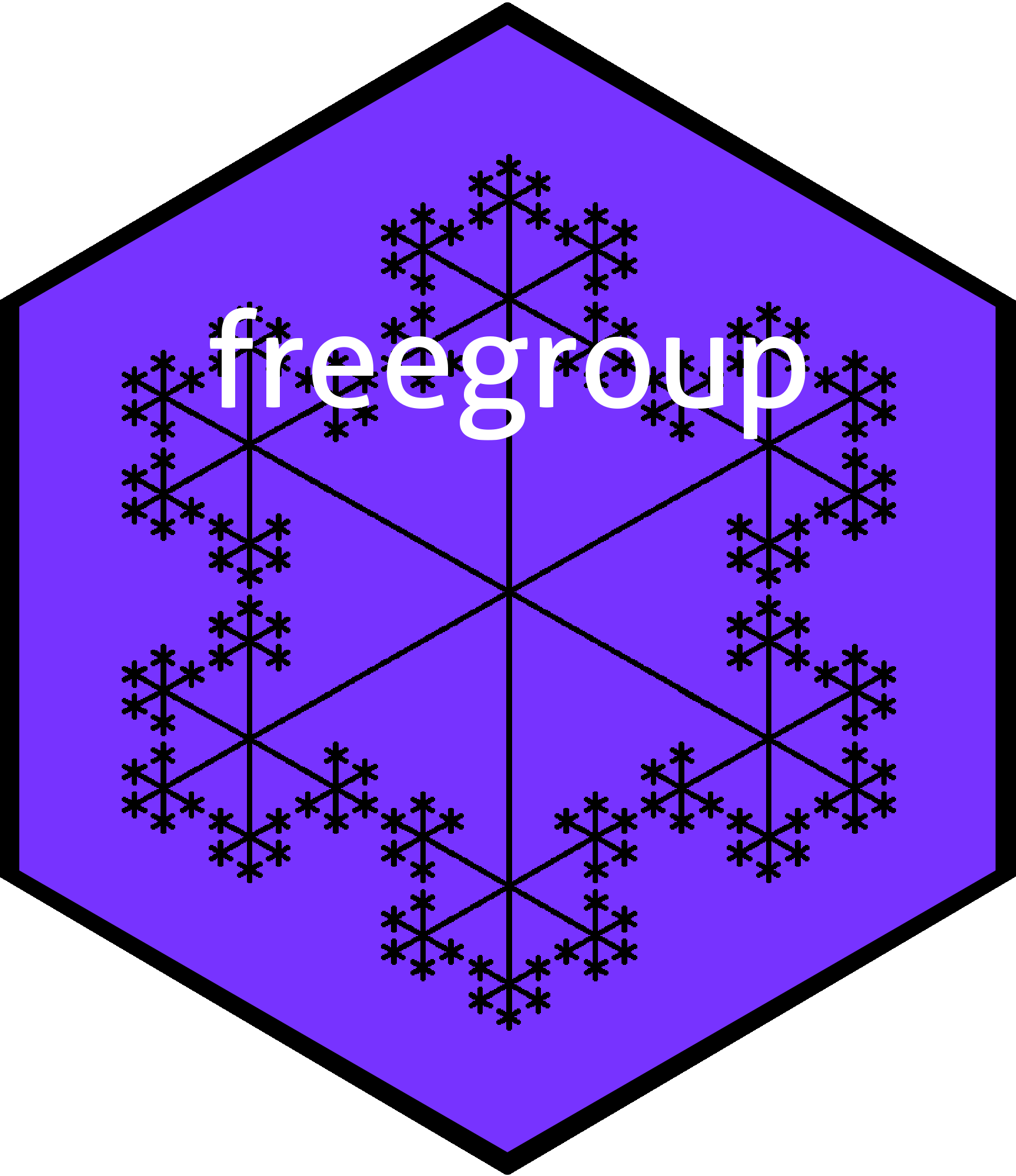

The freegroup package provides functionality for working
with the free group in R. A detailed vignette is provided in the
package. Informally, the free group is the set of
words that are objects like , with a group operation of string
juxtaposition. Usually one works only with words that are in ``reduced
form’’, which has successive powers of the same symbol combined, so
would
be equal to ; see how appears to the
third power and the term in the middle has vanished.
The group operation of juxtaposition is formally indicated by , but this is often omitted in algebraic notation; thus, for example .
You can install the released version of freegroup from CRAN with:
# install.packages("freegroup") # uncomment this to install the package
library("freegroup")freegroup package
in useFunction rfree() generates a vector of random free group
elements, giving quick “get you going” examples:
a <- rfree(10,5)
a
#> [1] a.d^5.a^-4.b^5.e^-3 a.e^2.b^2 a^3.e^-7.b^-3
#> [4] b^7.d^4 a^2.b^-4.c^-4 a^-5.d^3.c^3
#> [7] d^-5.e^-1.d^-5.e^3 c.b^-7.c^4.b^-5 c^6.e^2
#> [10] e^-3.d^5.a^-5
b <- as.free('x')Then we can perform various operations on these vectors:
a+b
#> [1] a.d^5.a^-4.b^5.e^-3.x a.e^2.b^2.x a^3.e^-7.b^-3.x
#> [4] b^7.d^4.x a^2.b^-4.c^-4.x a^-5.d^3.c^3.x
#> [7] d^-5.e^-1.d^-5.e^3.x c.b^-7.c^4.b^-5.x c^6.e^2.x
#> [10] e^-3.d^5.a^-5.x
a-b
#> [1] a.d^5.a^-4.b^5.e^-3.x^-1 a.e^2.b^2.x^-1 a^3.e^-7.b^-3.x^-1
#> [4] b^7.d^4.x^-1 a^2.b^-4.c^-4.x^-1 a^-5.d^3.c^3.x^-1
#> [7] d^-5.e^-1.d^-5.e^3.x^-1 c.b^-7.c^4.b^-5.x^-1 c^6.e^2.x^-1
#> [10] e^-3.d^5.a^-5.x^-1
a^b
#> [1] x^-1.a.d^5.a^-4.b^5.e^-3.x x^-1.a.e^2.b^2.x
#> [3] x^-1.a^3.e^-7.b^-3.x x^-1.b^7.d^4.x
#> [5] x^-1.a^2.b^-4.c^-4.x x^-1.a^-5.d^3.c^3.x
#> [7] x^-1.d^-5.e^-1.d^-5.e^3.x x^-1.c.b^-7.c^4.b^-5.x
#> [9] x^-1.c^6.e^2.x x^-1.e^-3.d^5.a^-5.xThere are a number of package functions that work in a vectorized way:
sum(a)
#> [1] a.d^5.a^-4.b^5.e^-3.a.e^2.b^2.a^3.e^-7.b^4.d^4.a^2.b^-4.c^-4.a^-5.d^3.c^3.d^-5.e^-1.d^-5.e^3.c.b^-7.c^4.b^-5.c^6.e^-1.d^5.a^-5The package also supports extraction and replacement:
a[3:9] <- as.free('xy')
a
#> [1] a.d^5.a^-4.b^5.e^-3 a.e^2.b^2 x.y
#> [4] x.y x.y x.y
#> [7] x.y x.y x.y
#> [10] e^-3.d^5.a^-5Various simple elements can be created:
alpha(1:10)
#> [1] a b c d e f g h i j
abc(1:5)
#> [1] a a.b a.b.c a.b.c.d a.b.c.d.eFor more detail, see the package vignette
vignette("freegroup")